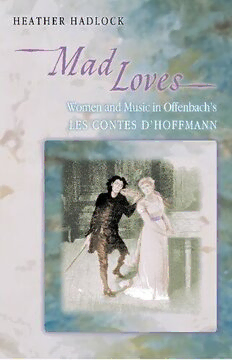
Mad Loves: Women and Music in Offenbach's Les Contes D'Hoffmann PDF
Preview Mad Loves: Women and Music in Offenbach's Les Contes D'Hoffmann
MAD LOVES PRINCETON STUDIES IN OPERA CAROLYN ABBATE AND ROGER PARKER SERIES EDITORS Reading Opera edited by Arthur Groos and Roger Parker Puccini’s Turandot: The End of the Great Tradition William Ashbrook and Harold Powers Unsung Voices: Opera and Musical Narrative in the Nineteenth Century Carolyn Abbate Wagner Androgyne Jean-Jacques Nattiez, translated by Stewart Spencer Music in the Theater: Essays on Verdi and Other Composers Pierluigi Petrobelli, with translations by Roger Parker Leonora’s Last Act: Essays in Verdian Discourse Roger Parker Richard Wagner, Fritz Lang, and the Nibelungen: The Dramaturgy of Disavowal David J. Levin Monstrous Opera: Rameau and the Tragic Tradition Charles Dill Metaphysical Song: An Essay on Opera Gary Tomlinson The Culture of Opera Buffa in Mozart’s Vienna: A Poetics of Entertainment Mary Hunter Mad Loves: Women and Music in Offenbach’s Les Contes d’Hoffmann Heather Hadlock Siren Songs: Representations of Gender and Sexuality in Opera edited by Mary Ann Smart MAD LOVES WOMEN AND MUSIC IN OFFENBACH’S LES CONTES D’HOFFMANN Heather Hadlock PRINCETON UNIVERSITY PRESS PRINCETON AND OXFORD Copyright © 2000 by Princeton University Press Published by Princeton University Press, 41 William Street, Princeton, New Jersey 08540 In the United Kingdom: Princeton University Press, Chichester, West Sussex All Rights Reserved Library of Congress Cataloging-in-Publication Data Hadlock, Heather Mad loves : women and music in Offenbach’s Les contes d’Hoffmann / Heather Hadlock. p. cm. Includes bibliographical references and index. ISBN 0-691-05802-4 (cl : alk. paper) 1. Offenbach, Jacques, 1819–1880. Contes d’Hoffmann. 2. Women in opera. I. Title. ML410.O41 H33 2000 782.1—dc21 00-023688 This book has been composed in Galliard The paper used in this publication meets the minimum requirements of ANSI/NISO Z39.48-1992 (R1997) (Permanence of Paper) http://pupress.princeton.edu Printed in the United States of America 1 3 5 7 9 10 8 6 4 2 “Voulez-vous le récit de ces folles amours?” Contents Acknowledgments ix Introduction 3 Chapter One Telling the Tales 17 Chapter Two Mesmerizing Voices: Music, Medicine, and the Invention of Dr. Miracle 42 Chapter Three Song as Symptom: Antonia, Olympia, and the Prima Donna Mother 67 Chapter Four Offenbach, for Posterity 86 Chapter Five Reflections on the Venetian Act 113 Notes 135 Bibliography 149 Index 161 Acknowledgments THROUGHOUTTHEresearch and writing of this book I have had many oc- casions to be grateful for Carolyn Abbate’s discernment and skill as an ad- visor, critic, and mentor. I have relied on Roger Parker’s critical and edi- torial acumen since the very early stages of this project, and his detailed commentary on the penultimate version of the manuscript did much to shape its final form. I also appreciate the encouragement I have received from my colleagues at Stanford University during that process of revision and transformation. The Opera Studies Workshop funded by the Stanford Humanities Center has provided a lively forum for discussions of opera and opera scholarship, due in large part to the ongoing involvement of Paul Robinson, Herbert Lindenberger, Karol Berger, Thomas Grey, and Ste- phen Hinton. John Speagle has been an indefatigable source of intellectual and moral support. Thanks are due to the Andrew Mellon Foundation, the American Mu- sicological Society, and the National Endowment for the Humanities Sum- mer Stipend Program for their support of dissertation and post-disserta- tion research and writing. I thank the program committees of the Third Feminist Theory and Music Conference (June 1995) and of the 1995 American Musicologial Society meeting for opportunities to present por- tions of the chapter on music and mesmerism; the University of Califor- nia–Berkeley colloquium audience for their stimulating response to my colloquium on the Venetian act in 1996; and Mary Ann Smart for inviting me to speak on Les Contes as a fantastical narrative in her 1999 symposium on “E.T.A. Hoffmann and Music,” also at Berkeley. An earlier version of Chapter Three appeared as “Returns of the Repressed: The Prima Donna from Hoffmann’s Tales to Offenbach’s Les Contes,” in Cambridge Opera Journal 6, no. 3 (November 1994): 221–43. From the moment I began to write it, I have imagined this book as an expression of gratitude to tenor Neil Shicoff, for his performance in the Metropolitan Opera’s 1988 Contes d’Hoffmann; and to my mother, for taping it.
